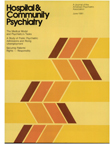Enhancing Medication Compliance in Coffee Groups
Abstract
In an adult outpatient department of a hospital serving a severely disadvantaged population, coffee groups have become an effective means of treating chronic, treatment-resistant patients and reinforcing their compliance with medication regimens. In dealing with the patients, many of whom have problems communicating needs and information, the therapists have developed such approaches as using concrete language, recognizing that many patients use medication transactions to reflect dissatisfaction with changes in group routine, anticipating common problems related to medication, and at times accepting patients' idiosyncratic chemotherapeutic preferences. Important elements of the coffee groups are the caring attitude of the co-therapists, a nonpressured atmosphere, and the presence of a familiar peer group.
Access content
To read the fulltext, please use one of the options below to sign in or purchase access.- Personal login
- Institutional Login
- Sign in via OpenAthens
- Register for access
-
Please login/register if you wish to pair your device and check access availability.
Not a subscriber?
PsychiatryOnline subscription options offer access to the DSM-5 library, books, journals, CME, and patient resources. This all-in-one virtual library provides psychiatrists and mental health professionals with key resources for diagnosis, treatment, research, and professional development.
Need more help? PsychiatryOnline Customer Service may be reached by emailing [email protected] or by calling 800-368-5777 (in the U.S.) or 703-907-7322 (outside the U.S.).



